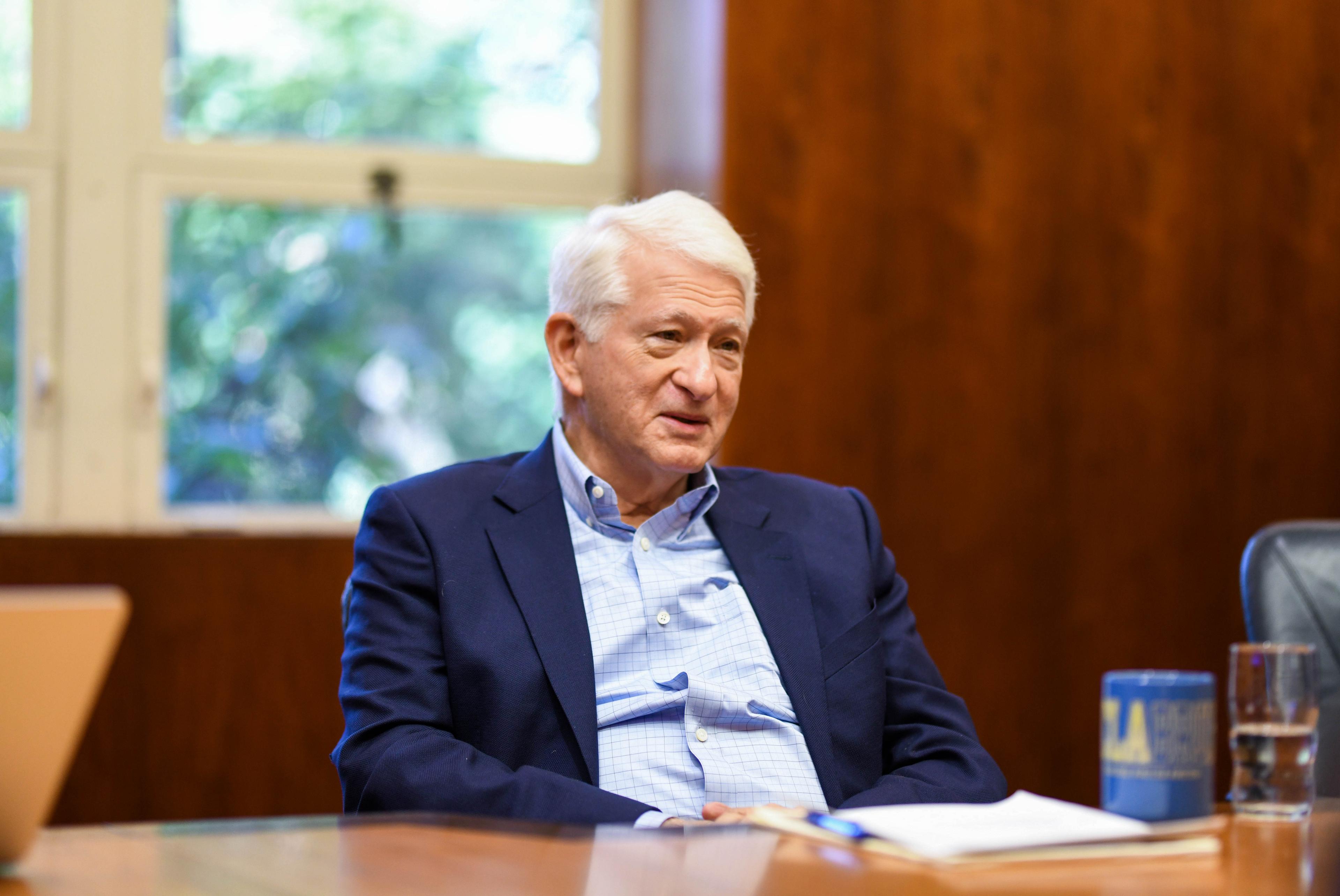Students reflect on Gene Block’s impact throughout his tenure as chancellor
Chancellor Gene Block is pictured. In August, Block announced he would step down from the role of chancellor July 31, 2024. (Jeremy Chen/Daily Bruin senior staff)
By Gabriella Sonnhalter
June 10, 2024 12:05 a.m.
As Chancellor Gene Block prepares to retire, his impact on students’ experiences remains mixed as they look toward the university’s future leadership.
Block served as chancellor for 17 years after arriving from the University of Virginia in 2007. In August, Block – a neuroscientist – announced he would step down from his role July 31 but will continue to pursue teaching and research at the university.
UCLA became the No. 1 public university in the nation for seven consecutive years from 2017 to 2024 under Block’s leadership.
“It definitely does show that as a chancellor, he has his strengths,” said Anisa Warshan, a first-year biochemistry student. “Just to be No. 1 – it goes to show he is definitely skilled at taking care of the school as a whole.”
Becoming the No. 1 public university also increased UCLA’s media attention, said Asseal Abdu, a first-year neuroscience student. She added that the increased attention on the campus has given the university significant influence and responsibility, as UCLA has become a name brand.
During his tenure, Block also implemented several diversity initiatives, such as setting the goal for UCLA to become a Hispanic-Serving Institution by 2025 – meaning Hispanic students will make up 25% of all UCLA students – and increase Latinx enrollment rates.
Warshan said that she has had the opportunity to interact with diverse groups in ways she hadn’t prior to coming to UCLA. The move toward becoming a Hispanic-Serving Institution is a step in the right direction, she said.
Despite his achievements, some students said Block’s response to pro-Palestine protests on campus made them view his tenure in a more negative light.
Warshan said she believed that Block failed to protect students when violent aggresors attacked the Palestine solidarity encampment April 30, which resulted in various injuries. Block should have worked harder to help the police identify those who were involved with the violence, she added.
“As the weeks progressed, my opinion of him was, I got more and more disappointed with his actions – not acknowledging how students are feeling and prioritizing student safety,” she said.
At 12:12 a.m. on May 1, Mary Osako, vice chancellor for strategic communications, said in a statement that law enforcement had been called for immediate support, but police did not intervene until over two hours later.
Anshul Khanna, a second-year economics and philosophy student, said Block should have taken responsibility for his response to the April 30 attack.
“They (police) should have stepped in, and when they didn’t, they failed,” he said. “I don’t really know how much power he had over that, but he could have definitely acknowledge that there was a mistake that happened.”
[Related: Law enforcement leadership structure at UCLA faces scrutiny in wake of encampment]
Abdu said she also believed Block did not take responsibility in his subsequent emails for the police’s failure to intervene. Although Block condemned the attacks in a May 2 campuswide email, he did not mention his personal role in directing the police response that night.
However, some other students said they appreciated the decisions Block made in a difficult situation.
Emma Brown, a second-year Latin student, said she believed Block acted with the safety of the UCLA community in mind when addressing the April 30 violence.
“I think it was a hard situation,” she said. “He cares for students, and I appreciate all that he did to try and protect us and try to protect staff.”
When looking toward the appointment of Block’s successor, students hoped for a leader in tune with student needs. UCLA has not yet confirmed when a new chancellor will be appointed.
Khanna said he hopes UCLA’s next chancellor continues to fund research and improve the quality of life at UCLA, citing the closure of some amenities in the John Wooden Center. He added that he hopes the next chancellor focuses on raising teaching assistants’ salaries and encourages them to have a more active role in the university.
Abdu said she hopes the next chancellor is well-informed about students’ needs. Having a chancellor who is able to take responsibility for their students and prioritize their protection is important to her, she added.
“People have appreciated him personally because he did walk around campus a lot and went to a lot of events like the First Thursday events,” she said. “That’s another reason why people are more disappointed in him – because we see him as somebody who’s connected to the students.”
Overall, Abdu said she hopes the next chancellor can make decisions under pressure and is committed to keeping students informed about issues that arise on campus.
“I would hope that the next chancellor is able to make quick decisions,” she said. “If there’s any issues that arise on campus, they’re able to respond quickly and keep students informed.”
